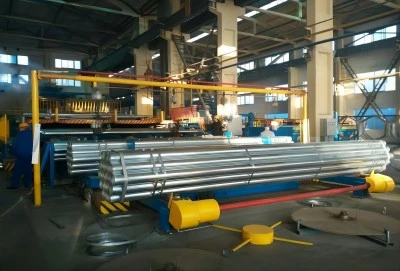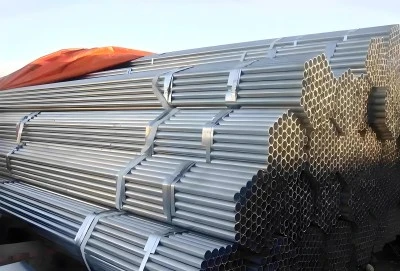Galvanized mild steel pipes are renowned for their exceptional durability and longevity in various industrial applications. These pipes can last anywhere from 40 to 70 years, depending on several factors such as installation quality, environmental conditions, and maintenance practices. The zinc coating on galvanized pipes provides a robust barrier against corrosion, significantly extending their lifespan compared to untreated steel pipes.
|
|
|
Average lifespan of galvanized pipes
Typical durability of galvanized steel pipes
Galvanized steel pipes have earned a reputation for their remarkable durability in various industrial settings. On average, these pipes can withstand the test of time for 40 to 70 years, making them a preferred choice for long-term infrastructure projects. The zinc coating applied during the galvanization process creates a sacrificial layer that protects the underlying steel from corrosion, significantly extending the pipe's service life.
In optimal conditions, galvanized pipes have been known to last even longer, with some installations remaining functional for up to a century. This exceptional longevity is particularly valuable in industries such as oil and gas transportation, where pipeline reliability is crucial for maintaining operational efficiency and safety standards.
Factors affecting galvanized pipe longevity
Several factors play a role in determining the lifespan of galvanized pipes. The quality of the initial galvanization process is paramount, as it directly influences the thickness and uniformity of the protective zinc coating. Pipes with a thicker zinc layer tend to have a longer lifespan, as they can withstand more wear and tear before exposing the underlying steel.
Environmental conditions also significantly impact pipe longevity. Exposure to harsh chemicals, extreme temperatures, or highly corrosive substances can accelerate the deterioration of the zinc coating. Additionally, the pH level of the transported fluid or surrounding soil can affect the rate of corrosion, with acidic environments posing a greater threat to the pipe's integrity.
Comparing lifespan to other pipe materials
When compared to other pipe materials, galvanized steel pipes often emerge as a cost-effective and durable solution. While copper pipes may last up to 50 years and PVC pipes can endure for 25 to 40 years, galvanized pipes offer a competitive lifespan at a fraction of the cost of some premium materials.
In industrial applications, such as offshore platform construction or large-scale water supply systems, the longevity of galvanized pipes becomes even more apparent. Their ability to withstand harsh conditions and maintain structural integrity over extended periods makes them a preferred choice for project procurement managers and plant equipment managers seeking reliable, long-term solutions.
Environmental factors influencing pipe longevity
Impact of soil conditions on galvanized pipesSoil conditions play a crucial role in determining the lifespan of galvanized pipes, especially in underground installations. The chemical composition, moisture content, and pH level of the soil can significantly affect the rate of corrosion. Acidic soils, typically with a pH below 6.5, can accelerate the deterioration of the zinc coating, potentially reducing the pipe's service life.
In areas with high clay content or poorly drained soils, galvanized pipes may face increased corrosion risks due to prolonged exposure to moisture. Conversely, well-drained, sandy soils tend to be less corrosive and can contribute to extended pipe longevity. For pipeline engineers working on global projects, understanding local soil conditions is essential for predicting and mitigating potential corrosion issues.
Water quality effects on pipe corrosion
The quality of water flowing through galvanized pipes can have a substantial impact on their lifespan. Hard water, characterized by high mineral content, can lead to scale buildup inside the pipes, potentially reducing flow rates and accelerating corrosion. On the other hand, soft water with low mineral content may be more corrosive to the zinc coating, especially if it has a low pH level.
In industrial settings, such as oil and gas transportation or water supply systems, monitoring and controlling water quality is crucial for maintaining pipe integrity. Treatment processes to adjust pH levels or remove corrosive elements can significantly extend the service life of galvanized pipes, ensuring reliable performance in critical infrastructure projects.
Climate considerations for galvanized pipe life
Climate plays a significant role in the longevity of galvanized pipes, particularly in outdoor installations. Regions with high humidity, frequent rainfall, or proximity to saltwater environments may experience accelerated corrosion rates. The combination of moisture and airborne salts can be particularly detrimental to the zinc coating, potentially shortening the pipe's lifespan.
Extreme temperature fluctuations can also affect pipe durability. In areas prone to freeze-thaw cycles, the expansion and contraction of water within the pipes can lead to stress and potential cracking. For project managers overseeing installations in diverse geographic locations, such as the Middle East, Australia, or Southeast Asia, considering local climate patterns is essential for selecting appropriate pipe materials and implementing effective protective measures.
Extending galvanized pipe service life
Proper installation techniques for longevityProper installation is crucial for maximizing the lifespan of galvanized pipes. Ensuring correct alignment and support prevents undue stress on the pipes, which can lead to premature failure. Using appropriate fittings and connectors that are compatible with galvanized steel helps maintain the integrity of the protective zinc coating at joints and connections.
For underground installations, implementing cathodic protection systems can significantly extend pipe life by providing an additional layer of corrosion resistance. This technique is particularly valuable in corrosive soil environments or areas with stray electrical currents that could accelerate pipe deterioration.
Maintenance tips to prolong galvanized pipe life
Regular maintenance is key to prolonging the service life of galvanized pipes. Conducting periodic inspections to identify early signs of corrosion or damage allows for timely interventions. Cleaning and flushing pipes at regular intervals help remove accumulated debris and scale, which can contribute to corrosion and reduced flow rates.
In industrial settings, implementing a comprehensive maintenance schedule that includes corrosion monitoring and protective coating touch-ups can significantly extend pipe longevity. For plant equipment managers, investing in preventive maintenance measures often proves more cost-effective than dealing with unexpected pipe failures.
Coating options for enhanced corrosion resistance
While galvanization provides excellent corrosion resistance, additional coating options can further enhance pipe longevity in challenging environments. Epoxy coatings applied over the galvanized layer offer superior protection against chemical exposure and abrasion, making them ideal for industrial applications.
For offshore platform construction or coastal installations, specialized marine-grade coatings can provide an extra barrier against saltwater corrosion. These advanced coating systems, when properly applied and maintained, can significantly extend the service life of galvanized pipes in even the most demanding environments.
Galvanized mild steel pipes offer impressive longevity, typically lasting 40 to 70 years or more with proper care and installation. Their durability makes them an excellent choice for various industrial applications, from oil and gas transportation to water supply systems. By considering environmental factors, implementing proper installation techniques, and maintaining regular upkeep, project managers and engineers can maximize the lifespan of galvanized pipes. This ensures reliable, cost-effective infrastructure solutions for long-term projects across diverse global markets.
China Galvanized Mild Steel Pipe Factory
Hebei Longma Group stands as a leading manufacturer of galvanized mild steel pipes, equipped with advanced production facilities imported from Germany. Our team of over 300 skilled employees, including 60+ technical experts, ensures top-quality products. We utilize state-of-the-art testing equipment, including ultrasonic flaw detectors and X-ray systems, to maintain the highest standards. With rapid production capabilities and comprehensive certifications like API 5L and ISO 9001, we offer competitive pricing and superior quality. Our galvanized steel pipes, available in sizes from 60.3mm to 1422mm outer diameter and 6.02mm to 50.8mm wall thickness, meet various international standards including API 5L, ASTM A53, EN10210, and AS/NZS 1163. For inquiries about our products or to discuss your specific needs, contact us at info@longma-group.com.














